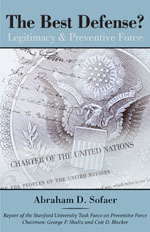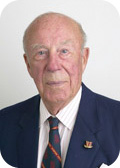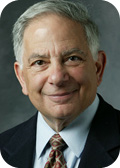The Best Defense? Cybersecurity Policy and its Implications |
|||||||||||||
| | Members RSVP | Apply to become a member | Guest Registration | Home | | |||||||||||||
DATE : May 19th, 2010
|

Author Abraham Sofaer offers a practical guide to identifying and considering the issues relevant to preventive uses of force, in the hope that such uses of force, if undertaken, will advance national and international security. Sofaer examines key questions on the subject: What are the dangers and limitations of relying on preventive force in dealing with security threats? When, if ever, would states be justified in using preventive force without U. N. Security Council approval? and more questions in the book. |
||||||||||||
| SPEAKER BIOGRAPHIES | |||||||||||||
 George Shultz, Thomas W. and Susan B. Ford Distinguished Fellow, Hoover Institution; Chair, Energy Policy Task Force; Member of the Working Group on Economic Policy George Shultz, Thomas W. and Susan B. Ford Distinguished Fellow, Hoover Institution; Chair, Energy Policy Task Force; Member of the Working Group on Economic PolicyGeorge P. Shultz is the Thomas W. and Susan B. Ford Distinguished Fellow at the Hoover Institution. He was sworn in on July 16, 1982, as the sixtieth U.S. secretary of state and served until January 20, 1989. In January 1989, he rejoined Stanford University as the Jack Steele Parker Professor of International Economics at the Graduate School of Business and as a distinguished fellow at the Hoover Institution. He is a member of the board of directors of Fremont Group and Accretive Health. He is chairman of the J. P. Morgan Chase International Council, chairman of the California governor's Council of Economic Advisers, and U.S. chair of the North American Forum. He is the advisory council chair of the Precourt Institute for Energy Efficiency at Stanford University, chair of the MIT Energy Initiative External Advisory Board, and chair of the Energy Task Force at Hoover Institution. From 1981 until his appointment as U.S. secretary of state, Shultz was chairman of President Ronald Reagan's Economic Policy Advisory Board. He became secretary of the Treasury in May 1972, serving until May 1974. During that period he also served as chairman of the Council on Economic Policy. As chairman of the East-West Trade Policy Committee, Shultz traveled to Moscow in 1973 and negotiated a series of trade protocols with the Soviet Union. He also represented the United States at the Tokyo meeting of the General Agreement on Tariffs and Trade. In 1974, he left government service to become president and director of Bechtel Group, where he remained until 1982. While at Bechtel, he maintained his close ties with the academic world by joining the faculty of Stanford University on a part-time basis. Shultz served in the administration of President Richard Nixon as secretary of labor for eighteen months, from 1969 to June 1970, at which time he was appointed director of the Office of Management and Budget. From 1968 to 1969, he was a fellow at the Center for Advanced Study in the Behavioral Sciences at Stanford. In 1957, Shultz was appointed professor of industrial relations at the University of Chicago Graduate School of Business. He was named dean of the Graduate School of Business in 1962. He taught in the Department of Economics at the Massachusetts Institute of Technology from 1948 to 1957, taking a year's leave of absence in 1955 to serve as senior staff economist on the president's Council of Economic Advisers during the administration of President Dwight Eisenhower. |
|||||||||||||
Herbert Lin, Chief Scientist, CSTB, The National Academies
|
|||||||||||||
 Abe Sofaer, George P. Shultz Senior Fellow in Foreign Policy and National Security Affairs, Hoover Institution; Member of the Task Force on Energy Policy Abe Sofaer, George P. Shultz Senior Fellow in Foreign Policy and National Security Affairs, Hoover Institution; Member of the Task Force on Energy PolicyAbraham D. Sofaer, who served as legal adviser to the U.S. Department of State from 1985 to 1990, was appointed the first George P. Shultz Distinguished Scholar and Senior Fellow at the Hoover Institution in 1994. Named in honor of former U.S. secretary of state George P. Shultz, the appointment is awarded to a senior scholar of international prominence whose broad vision, knowledge, and skill can be brought to bear on the problems presented by a radically transformed global environment. Sofaer's work has focused on separation of powers issues in the American system of government, including the power over war, and on issues related to international law, terrorism, diplomacy, national security, the Middle East conflict, and water resources. He teaches a course on transnational law at the Stanford Law School. During his distinguished career, Sofaer has been a prosecutor, legal educator, judge, government official, and attorney in private practice. His most recent book is The Best Defense? Legitimacy and Preventive Force (Hoover Institution Press, 2010). In 1985, then secretary of state Shultz asked Sofaer to become legal adviser to the U.S. Department of State, a position in which he served until 1990. He was principal negotiator in various interstate matters that were successfully resolved, including the dispute between Egypt and Israel over Taba, the claim against Iraq for its attack on the USS Stark, and the claims against Chile for the assassination of diplomat Orlando Letelier. He received the Distinguished Service Award in 1989, the highest state department award given to a non-civil servant. In 1979, Sofaer was appointed U.S. district judge in the Southern District of New York, where he served until 1985. He published numerous opinions and handled several high-profile cases, including the libel action against Time magazine by Israeli general Ariel Sharon. He was a clerk to Judge J. Skelly Wright on the U.S. Court of Appeals in Washington, D.C., and to the Honorable William J. Brennan Jr., associate justice of the U.S. Supreme Court from 1965 to 1967. After leaving the Department of State, Sofaer practiced law at Hughes, Hubbard and Reed in Washington, D.C., from 1990 to 1994. A veteran of the U.S. Air Force, Sofaer received an LL.B. degree from New York University School of Law in 1965, where he was editor in chief of the law review and a Root-Tilden scholar. He holds a B.A. in history from Yeshiva College (1962). Sofaer was awarded the degree Doctor of Laws, honoris causa, in 1980 by Yeshiva University. |
|||||||||||||
| | Members RSVP | Participating companies | Apply to become a member | | |||||||||||||
 Dr. Herbert Lin is chief scientist at the Computer Science and Telecommunications Board, National Research Council of the National Academies, where he has been study director of major projects on public policy and information technology. These studies include a 1996 study on national cryptography policy (Cryptography's Role in Securing the Information Society), a 1991 study on the future of computer science (Computing the Future), a 1999 study of Defense Department systems for command, control, communications, computing, and intelligence (Realizing the Potential of C4I: Fundamental Challenges), a 2000 study on workforce issues in high-technology (Building a Workforce for the Information Economy), a 2002 study on protecting kids from Internet pornography and sexual exploitation (Youth, Pornography, and the Internet), a 2004 study on aspects of the FBI's information technology modernization program (A Review of the FBI's Trilogy IT Modernization Program), a 2005 study on electronic voting (Asking the Right Questions About Electronic Voting), a 2005 study on computational biology (Catalyzing Inquiry at the Interface of Computing and Biology), a 2007 study on privacy and information technology (Engaging Privacy and Information Technology in a Digital Age), a 2007 study on cybersecurity research (Toward a Safer and More Secure Cyberspace), a 2009 on healthcare informatics (Computational Technology for Effective Health Care: Immediate Steps and Strategic Directions), and a 2009 study on offensive information warfare (Technology, Policy, Law, and Ethics Regarding U.S. Acquisition and Use of Cyberattack Capabilities).
Prior to his NRC service, he was a professional staff member and staff scientist for the House Armed Services Committee (1986-1990), where his portfolio included defense policy and arms control issues. He received his doctorate in physics from MIT.
Avocationally, he is a longtime folk and swing dancer and a poor magician. Apart from his CSTB work, he is published in cognitive science, science education, biophysics, and arms control and defense policy. He also consults on K-12 math and science education
Dr. Herbert Lin is chief scientist at the Computer Science and Telecommunications Board, National Research Council of the National Academies, where he has been study director of major projects on public policy and information technology. These studies include a 1996 study on national cryptography policy (Cryptography's Role in Securing the Information Society), a 1991 study on the future of computer science (Computing the Future), a 1999 study of Defense Department systems for command, control, communications, computing, and intelligence (Realizing the Potential of C4I: Fundamental Challenges), a 2000 study on workforce issues in high-technology (Building a Workforce for the Information Economy), a 2002 study on protecting kids from Internet pornography and sexual exploitation (Youth, Pornography, and the Internet), a 2004 study on aspects of the FBI's information technology modernization program (A Review of the FBI's Trilogy IT Modernization Program), a 2005 study on electronic voting (Asking the Right Questions About Electronic Voting), a 2005 study on computational biology (Catalyzing Inquiry at the Interface of Computing and Biology), a 2007 study on privacy and information technology (Engaging Privacy and Information Technology in a Digital Age), a 2007 study on cybersecurity research (Toward a Safer and More Secure Cyberspace), a 2009 on healthcare informatics (Computational Technology for Effective Health Care: Immediate Steps and Strategic Directions), and a 2009 study on offensive information warfare (Technology, Policy, Law, and Ethics Regarding U.S. Acquisition and Use of Cyberattack Capabilities).
Prior to his NRC service, he was a professional staff member and staff scientist for the House Armed Services Committee (1986-1990), where his portfolio included defense policy and arms control issues. He received his doctorate in physics from MIT.
Avocationally, he is a longtime folk and swing dancer and a poor magician. Apart from his CSTB work, he is published in cognitive science, science education, biophysics, and arms control and defense policy. He also consults on K-12 math and science education

